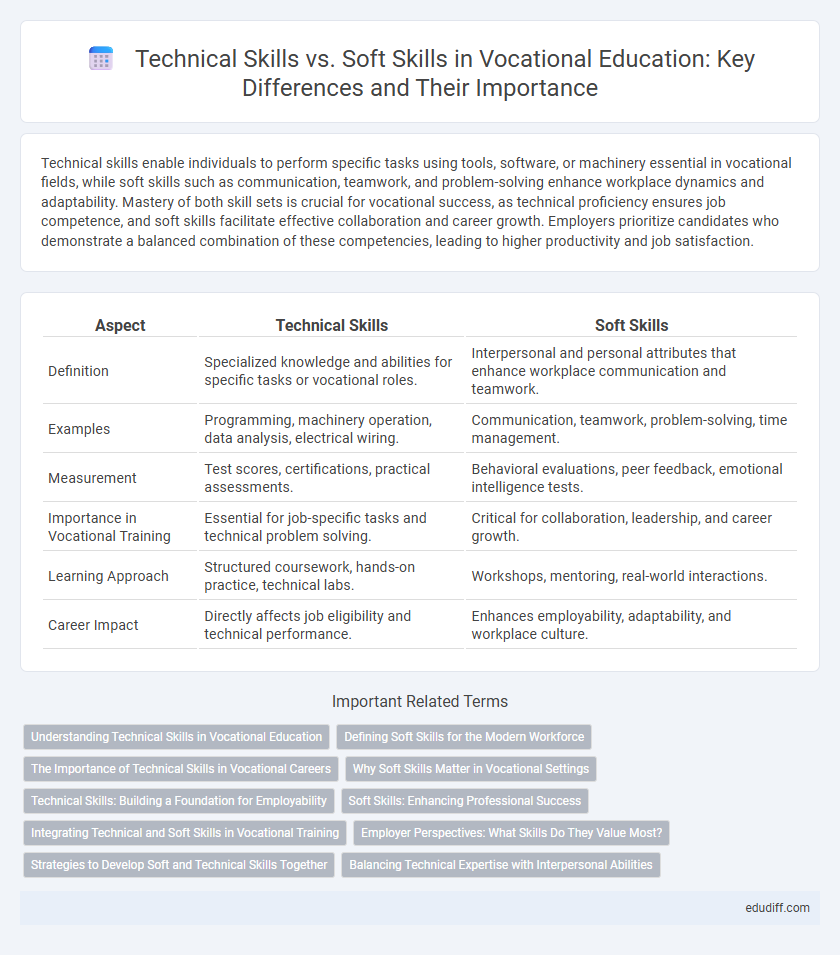Technical skills enable individuals to perform specific tasks using tools, software, or machinery essential in vocational fields, while soft skills such as communication, teamwork, and problem-solving enhance workplace dynamics and adaptability. Mastery of both skill sets is crucial for vocational success, as technical proficiency ensures job competence, and soft skills facilitate effective collaboration and career growth. Employers prioritize candidates who demonstrate a balanced combination of these competencies, leading to higher productivity and job satisfaction.
Table of Comparison
| Aspect | Technical Skills | Soft Skills |
|---|---|---|
| Definition | Specialized knowledge and abilities for specific tasks or vocational roles. | Interpersonal and personal attributes that enhance workplace communication and teamwork. |
| Examples | Programming, machinery operation, data analysis, electrical wiring. | Communication, teamwork, problem-solving, time management. |
| Measurement | Test scores, certifications, practical assessments. | Behavioral evaluations, peer feedback, emotional intelligence tests. |
| Importance in Vocational Training | Essential for job-specific tasks and technical problem solving. | Critical for collaboration, leadership, and career growth. |
| Learning Approach | Structured coursework, hands-on practice, technical labs. | Workshops, mentoring, real-world interactions. |
| Career Impact | Directly affects job eligibility and technical performance. | Enhances employability, adaptability, and workplace culture. |
Understanding Technical Skills in Vocational Education
Technical skills in vocational education encompass specific, practical abilities such as operating machinery, programming software, and performing industry-standard procedures essential for job proficiency. Mastery of these skills is critical for students to meet the demands of skilled trades and technical professions, ensuring they can execute tasks with precision and efficiency. Developing technical skills through hands-on training and real-world applications directly enhances employability and productivity in sectors like manufacturing, IT, construction, and healthcare.
Defining Soft Skills for the Modern Workforce
Soft skills encompass interpersonal abilities such as communication, adaptability, teamwork, and problem-solving critical for effective collaboration in the modern workforce. These skills complement technical expertise by enhancing emotional intelligence and fostering a positive work environment. Employers prioritize soft skills for roles requiring leadership, customer interaction, and innovation, recognizing their impact on productivity and organizational success.
The Importance of Technical Skills in Vocational Careers
Technical skills in vocational careers are critical for hands-on job performance and industry-specific tasks, directly impacting efficiency and precision. Mastery of tools, machinery, and software relevant to trades like carpentry, electrical work, or automotive repair ensures workers meet professional standards and safety regulations. Employers prioritize these competencies as they translate into measurable productivity and reduced error rates on the job.
Why Soft Skills Matter in Vocational Settings
Soft skills such as communication, teamwork, and problem-solving are critical in vocational settings because they enhance workplace collaboration and adaptability. Employers increasingly prioritize these interpersonal abilities alongside technical competencies to ensure efficient workflow and customer satisfaction. Developing soft skills leads to improved job performance, career advancement, and a positive work environment in skilled trades and vocational professions.
Technical Skills: Building a Foundation for Employability
Mastering technical skills such as data analysis, coding, and machinery operation significantly enhances job readiness in vocational fields. Employers prioritize candidates with hands-on expertise in industry-specific tools, software, and methodologies that drive productivity and innovation. Developing a strong technical skill set establishes a solid foundation for career advancement and long-term employability.
Soft Skills: Enhancing Professional Success
Soft skills such as communication, teamwork, adaptability, and problem-solving are crucial for enhancing professional success in vocational fields. Employers increasingly prioritize these interpersonal abilities alongside technical expertise to improve workplace collaboration and productivity. Mastering soft skills leads to better client relationships, effective leadership, and faster career advancement.
Integrating Technical and Soft Skills in Vocational Training
Integrating technical and soft skills in vocational training enhances learner competence by combining practical expertise with communication, teamwork, and problem-solving abilities. Vocational programs that emphasize collaborative projects, real-world simulations, and interpersonal skill development foster a workforce prepared for dynamic workplace environments. Employers increasingly value candidates who demonstrate both industry-specific technical proficiency and adaptability through effective soft skills.
Employer Perspectives: What Skills Do They Value Most?
Employers in vocational fields prioritize technical skills such as proficiency in specialized machinery, coding languages, or trade-specific certifications because these competencies directly impact job performance and productivity. Soft skills like communication, teamwork, and problem-solving are also highly valued as they enhance workplace collaboration and adaptability in dynamic environments. Surveys indicate that 85% of employers consider a balanced combination of technical expertise and interpersonal abilities crucial for long-term employee success.
Strategies to Develop Soft and Technical Skills Together
Integrating project-based learning with collaborative teamwork enhances both technical skills and soft skills such as communication and problem-solving. Utilizing mentorship programs enables learners to acquire hands-on technical expertise while receiving real-time feedback on interpersonal abilities. Regularly scheduled workshops combining technical drills and role-playing scenarios foster simultaneous growth in proficiency and emotional intelligence.
Balancing Technical Expertise with Interpersonal Abilities
Mastering technical skills such as coding, machinery operation, or data analysis is crucial for vocational success, yet balancing these with soft skills like communication, teamwork, and problem-solving ensures holistic professional growth. Employers increasingly value candidates who demonstrate adaptability, emotional intelligence, and collaboration alongside specialized knowledge. Cultivating both technical expertise and interpersonal abilities enhances workplace efficiency and career advancement opportunities in vocational fields.
Technical Skills vs Soft Skills Infographic

 edudiff.com
edudiff.com